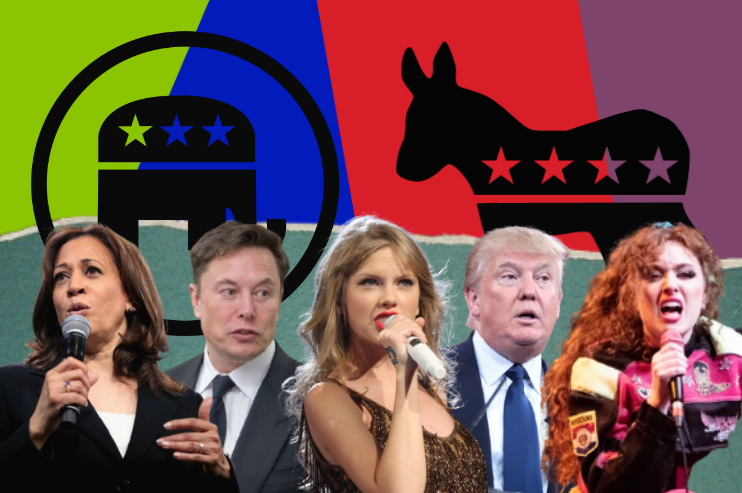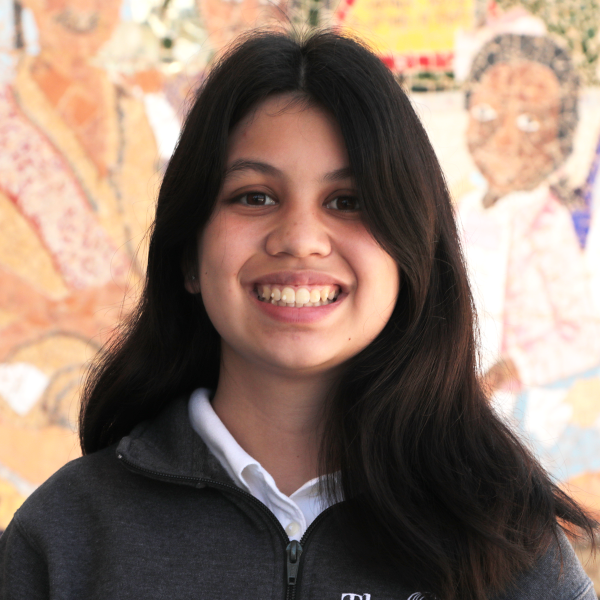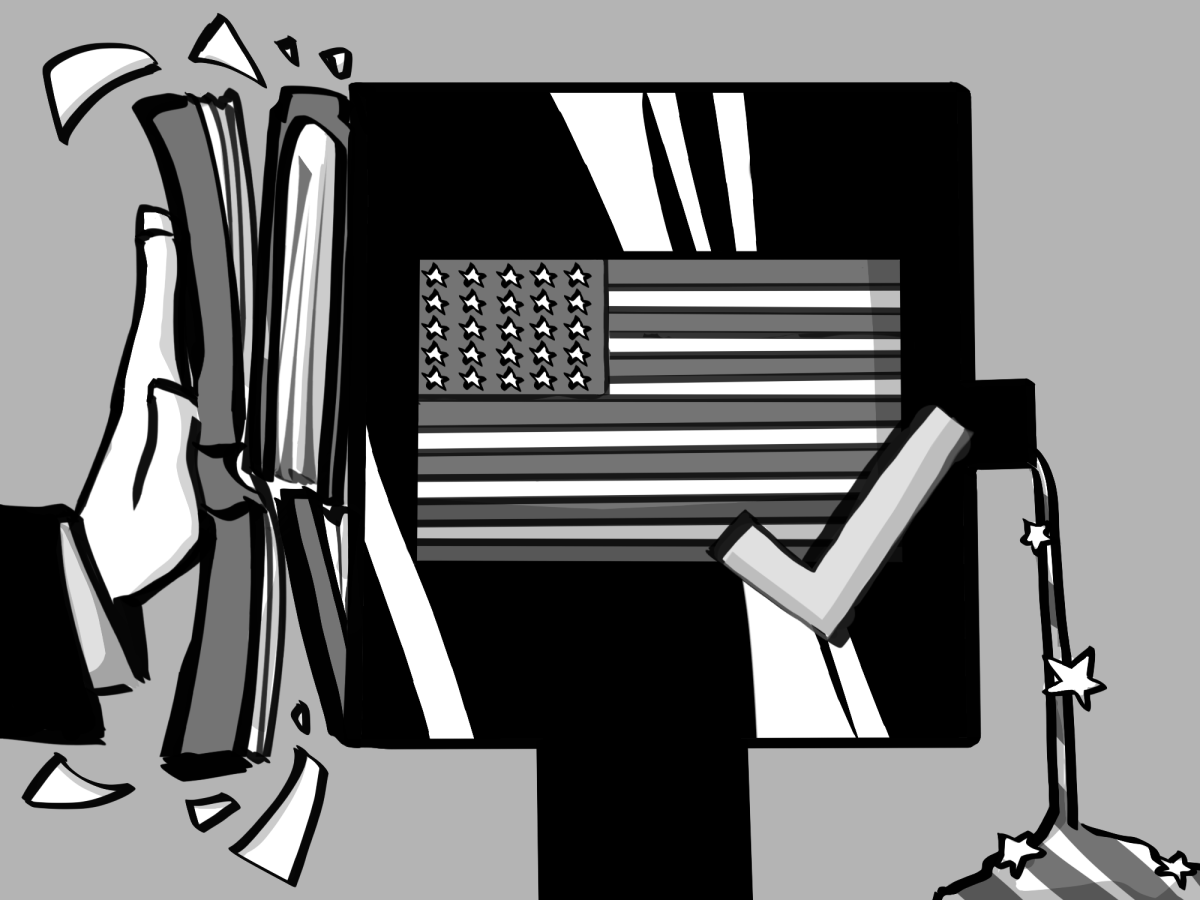As the time to elect the 47th President of the United States draws nearer, celebrities weigh in left and right — literally and figuratively. Ever since President Warren G. Harding was elected in 1920, stars have vouched for political candidates to persuade the masses to do the same. However, while celebrity endorsements may sway their fans one way or another, in most cases, their outreach is likely too weak to make a difference in an election, even one as divisive as this year’s.
The film and television industry has been rampant with election discourse. Former President Donald Trump has had many consistent supporters in the public eye over the last few years, such as Kanye West and Elon Musk. Additionally, Zachary Levi and James Woods, who respectively voiced Flynn Rider in Tangled and Hades in Hercules, also promoted Trump. Jake Paul made an Instagram post expressing his desire for the former President to save the nation from war, “the woke agenda,” and the loss of freedom of speech. The majority of Trump’s famous advocates are very outspoken, which makes enjoyment of their content dependent on individual values. A person who dislikes stirring language may not appreciate the former President’s statements to begin with, and this would also apply to his followers.
Meanwhile, Vice President Kamala Harris has some of the most currently prevalent entertainers in the country on her side. Famous actors who support Harris include Bryan Cranston of “Breaking Bad,” Aubrey Plaza and Nick Offerman of “Parks and Recreation,” and Lin-Manuel Miranda of Hamilton and Moana. Charli XCX, meanwhile, fully integrated Harris into her fanbase, tweeting in July that “kamala IS brat,” which the Vice President’s team acknowledged by changing her X account background to the album’s iconic lime green. Harris’ luminary allies seem to follow her focus on clarity and directness, and their projects often align with Democratic views. It stands to reason that appreciating them and their work would sync with supporting Harris prior to the election.
The most prevalent endorsement for this election is, arguably, Taylor Swift’s. After the first presidential debate, the pop star officially endorsed Harris on Instagram, calling her “a warrior” and “a steady-handed, gifted leader.” The next day, CBS reported that 400,000 people had visited vote.org, a website that helps people prepare to vote.
As society becomes more and more dependent on social media, voters should investigate and account for separate views to develop a better-rounded perspective.
In the middle of the spectrum, rising pop star Chappell Roan has made it clear that she intends to vote for Harris, but also that she won’t officially endorse either candidate. After her initial comments on the subject received backlash, she took to TikTok to explain that she doesn’t trust either party enough to “put [her] name behind someone.” Roan’s post doesn’t seem to have impacted the positions of her primarily liberal fans, but she brings a new perspective to the situation, since most celebrities who have doubts about politics don’t talk about it at all. Those who generally agree with her views wouldn’t change theirs even if she’d said she was voting for Trump, proving the lack of endorsement inconsequential either way.
Even beyond Swift, seeing such influential figures speaking out for their political beliefs might inspire their fanbases to vote in turn and fight for their beliefs. No matter what these beliefs are, it’s important for voters of all qualities of life and backgrounds, especially younger individuals, to understand the difference they can make in America’s political system. Therefore, as society becomes more and more dependent on social media, voters should investigate and account for separate views to develop a better-rounded perspective.
While seeing their favorite actor or singer vote at all may persuade someone to vote as well, it’s unlikely a celebrity can actually convert their fans to their political views. In a CBS article, Hamline University political science professor David Schultz says that a celebrity endorsement could lead less enthusiastic citizens to vote, but also that they only make a difference in specific circumstances, such as Oprah Winfrey backing former President Barack Obama in the 2008 Democratic primary election. Swift may have populated the polls, but according to Morning Consult, the majority of her fans were democratic to begin with.
Additionally, everyday Americans might not be able to identify with Hollywood’s privileged perspective on these issues. Placing less importance on the unreachable stars and making the candidates’ principles accessible to ordinary citizens through other means may do a better job convincing the populace to vote one way or the other. Mark Harvey, director of University of St. Mary’s MBA program, posits that the impact of an endorsement depends on how the person’s image matches up with what’s being endorsed. It comes down to each person’s fundamental principles — they have to do their own research in order to strengthen or loosen these beliefs instead of depending on their favorite singers to make decisions for them.
Celebrities supporting certain political movements may affect how their fans see them, but not how the fans see the situation itself. What truly matters is having accurate information to ruminate on, and celebrities can’t always be trusted to provide that. Every vote is significant, so every voter should carefully study the available facts before deciding the country’s fate.




























































